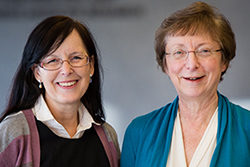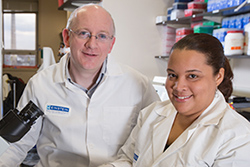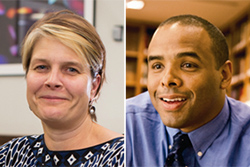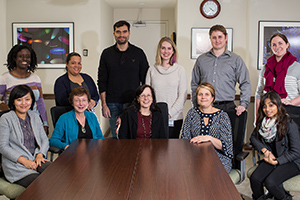

Postdoc Training
A BETTR Way to Teach and Do Research
While it's a bit jarring to go from an engrossing research lab to a lively lecture hall with hundreds of students, Dr. Esther Peterson is learning how to live in both worlds. "I'd never taught 100 students at a time," said the postdoctoral fellow in Dr. Paraic Kenny's laboratory. "But I'm learning how to engage them in my lectures, and how to use innovative teaching techniques to facilitate their long-lasting learning."

Drs. Dianne Cox and Barbara BirshteinDr. Peterson is one of three scholars in a unique, three-year postdoctoral training program — Bronx-Einstein Training in Teaching and Research (BETTR) — now offered at Einstein. Funded by a five-year grant from the National Institutes of Health (NIH), as part of their Institutional Research and Academic Career Development Award (IRACDA), BETTR combines training in independent research with opportunities to learn innovative education techniques, along with hands-on teaching experience.
"With support from IRACDA, the goal is to involve underrepresented minorities in academic science," said Dr. Barbara Birshtein, professor of cell biology, who with Dr. Dianne Cox is co-principal investigator of Einstein's BETTR program.
"Our program will serve as a pipeline locally, to increase minority representation in the field," added Dr. Cox, professor of anatomy and structural biology and of developmental & molecular biology. Of the 19 IRACDA programs in the country — which includes institutions such as Stanford, Baylor and University of Pennsylvania — Einstein's is one of just two in the New York metro area (the other being SUNY Stony Brook).
Through the BETTR program, Einstein is partnering with two Bronx neighbors: Lehman College, a four-year undergraduate college, and Eugenio María de Hostos Community College, a two-year community college. Both institutions are part of the City University of New York (CUNY) and serve largely minority student bodies.

Dr. Paraic Kenny with Dr. Esther PetersonDuring BETTR's first year, Dr. Peterson was one of three BETTR scholars, along with Dr. Katharine Bee, mentored by Dr. Robert Burk, and Dr. Javier Suarez, mentored by Dr. Vern Schramm. Currently, eight scholar slots have been filled, with Drs. Brett Hirsch (mentored by Dr. Schramm), Na Xu (mentored by Drs. Arthur Skoultchi and Dmitry Fyodorov) and Kessler McCoy-Simandle (mentored by Dr. Cox) beginning the program this academic year, and Drs. Francine Morris (mentored by Drs. Peng Wu and Matt Levy) and Christopher Blackwood (mentored by Dr. Jean Hebert) selected to begin the program in the 2014-15 academic year. In addition, Dr. Punita Bhansali (mentored by Dr. Wei Liu) will serve as an associate in the program.
Each scholar spends approximately 25 percent of their time teaching and 75 percent on research. "It's exciting to open students' eyes to the possibilities of careers in science," said Dr. Bee. "Through BETTR, we're able to make science careers more accessible and less intimidating."
Before entering the program, scholars spend a year at Einstein establishing their research project, funded by their research mentors. During the first year, while continuing their research, they also choose a teaching mentor and attend a course on teaching and course design, led by Einstein's Dr. Michael Risley. The scholars' activities are rounded out with workshops on education at Einstein, at its BETTR partners and at national meetings.
Over the following two years, the scholars attend a scientific conference, present at seminars, publish their research and become mentors by training an undergraduate in their respective research mentors' labs during the summer. The undergraduates take part in one of several undergraduate research programs offered at Einstein, including the Minority Student Research Program. And, as part of a major networking initiative, BETTR scholars and mentors attend an annual national NIH-IRADCA meeting, hosted by one of the 19 participating programs.
Throughout the three years of the program, scholars teach a course that they develop. They receive feedback from both their teaching mentor and their students, and assemble a teaching portfolio — all while continuing their research.

From left: Dr. Liesl Jones, BETTR program coordinator for Lehman College and Dr. Nelson Núñez-Rodríguez, BETTR program coordinator for Hostos Community CollegeWhen scholars aren't teaching at Einstein's educational partner institutions, they're working in the labs with their Einstein research mentors. For Dr. Peterson, that means studying various factors involved with breast cancer with Dr. Kenny, assistant professor of developmental and molecular biology. The research provides a foundation for Dr. Peterson's future academic career.
"We're working on the contribution of a growth factor, amphiregulin, to the development and progression of breast cancer," explained Dr. Kenny. "We're interested in learning whether it may be a useful clinical marker for the presence of the disease."
An Opportunity to Hone Teaching Skills
Like her fellow BETTR scholars, Dr. Peterson had some previous experience with teaching prior to coming to Einstein. The native of Puerto Rico earned her bachelor's degree from the University of Puerto Rico at Río Piedras, and her Ph.D. in human genetics from the University of Michigan at Ann Arbor. Her first encounter with teaching occurred in Michigan.
"I taught minority students in after-school programs, as well as in a summer program aimed at getting talented high school students interested in science."
To begin her BETTR teaching training, last year, Dr. Peterson shadowed Dr. Liesl Jones, professor and chair of biological sciences at Lehman, during an introductory biology class, the gateway course for science majors. "As a scientist working in a lab, you're responsible for your own project, generation of data and your own success," noted Dr. Peterson. "It's definitely different than designing a useful class and being in charge of conveying knowledge to a group of students. The obligation is greater and your impact as an educator to those students is extremely important to their success."
In addition, she redesigned the molecular biology laboratory class under the supervision of Dr. Moira Sauane, assistant professor at Lehman. Currently, Dr. Peterson is teaching the general biology laboratory class and is introducing Peer-led Team Learning, an innovative educational model, in collaboration with fellow BETTR scholar Dr. McCoy-Simandle.

BETTR program participants (clockwise from rear left): Program scholars, Drs. Francine Morris, Esther Peterson, Javier Suarez, Kessler McCoy-Simandle, Brett Hirsch, Katharine Bee and Punita Bhansali; program coordinator at Lehman, Dr. Liesl Jones; program co-principal investigators, Drs. Dianne Cox and Barbara Birshtein; scholar Dr. Na Xu. (Not pictured, program scholar Dr. Christopher Blackwood and program coordinator at Hostos, Dr. Nelson Núñez-Rodríguez.) "BETTR is an amazing program that's been going very well for us," said Dr. Jones, who also is Lehman's BETTR program coordinator.
Reaching Students
Dr. Peterson has enjoyed her role as mentor. "Some of my students have contacted me after class to find out about my career path to become a research scientist and educator," she said. "They're interested in doing a Ph.D. that involves research and they feel more comfortable talking to someone like myself, who has a similar background to theirs."
She continued, "I talk to them about how to make the right career choice in terms of research or education, or a combination. I also discuss different aspects of my job, as well as the additional things I do outside the lab that are part of my formal training as a research scientist."
"While we work very hard to show our students that there are other viable careers besides medicine, and to encourage them to continue their studies in grad school, having BETTR scholars is helpful because the students see someone like themselves who has pursued this course of study in science," noted Dr. Jones.
"BETTR offers a way for minority students to realize their dreams, and it introduces them to possibilities they may not have considered when studying science," added Dr. Nelson Nuñez-Rodriguez, associate professor of physical sciences and program coordinator for Hostos. "We view mentoring as an organic process that begins in the classroom and embraces not only academic but also human aspects of our student population."
Reaping Multiple Benefits
"We're also working with faculty from Lehman and Hostos on possible NIH-supported grant opportunities," said Dr. Birshtein.
"The brightest news, though, is that academic job prospects are very promising for those with both the research and academic experience that our scholars develop through participation in the BETTR program," added Dr. Cox. "Among participants nationwide, two-thirds of IRACDA scholars pursue academic careers as scientist-educators, many at teaching-focused institutions that serve minorities."
To date, two of the BETTR program's initial scholars — Drs. Suarez and Peterson — have begun applying for academic positions.
For information on applying, visit Einstein's BETTR program website.
Photo Gallery
(To view slideshow of photo gallery, click on an image below; then move your mouse over the left or right margins to navigate.)
Posted on: Tuesday, December 17, 2013









Tablet Blog